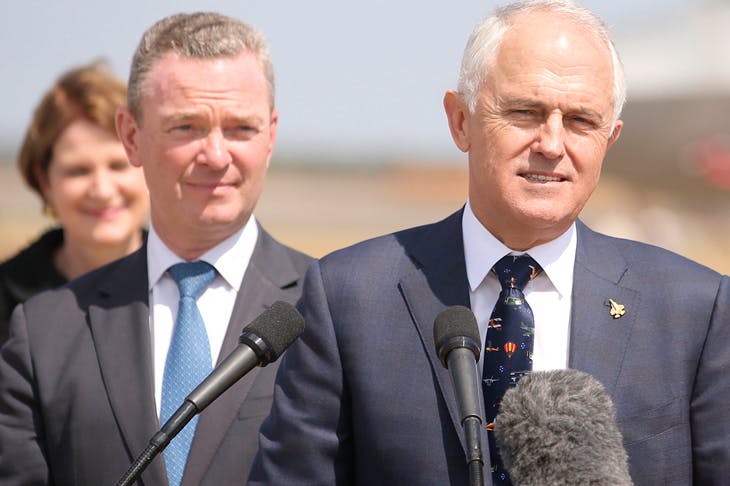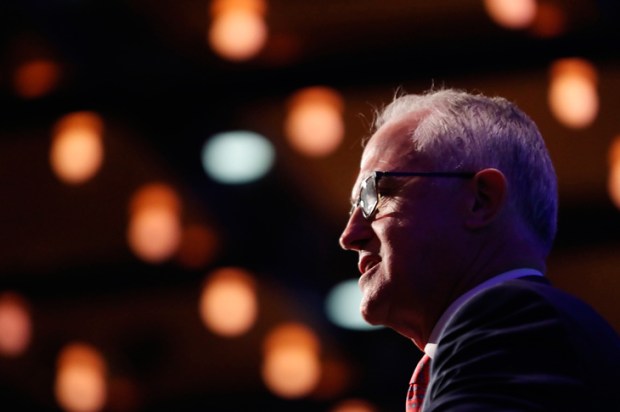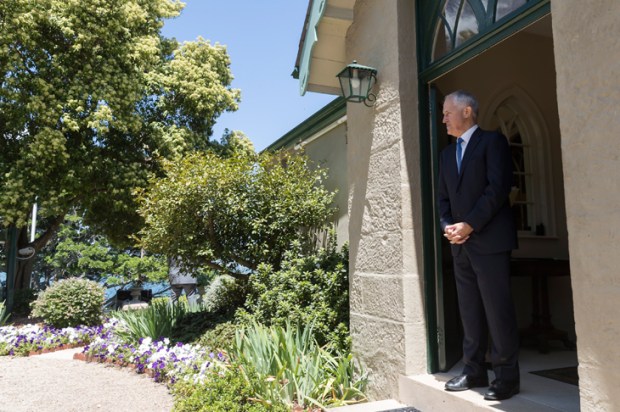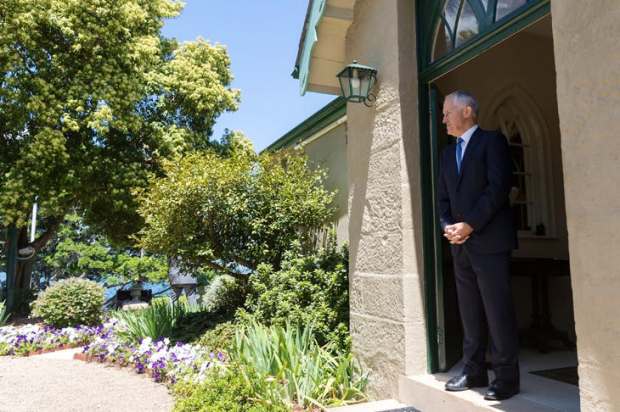Recently, Malcolm Turnbull has from time to time tried to act like the centre-right leader of a centre-right government, which is what is needed if the Coalition is to have any chance of being reelected.
After rejecting any change during the last election campaign, last week theTurnbull government had a good go at reforming section 18C of the Racial Discrimination Act. In this, the PM had the public support from Tony Abbott that Abbott never had from him last time round. Then last Friday, Turnbull achieved success in passing significant corporate tax cuts for businesses with turnovers under $50 million. Earlier in the parliamentary session, Turnbull had introduced Heydon Royal Commission-recommended legislation to stop companies making payments to unions during bargaining negotiations. He tabled a multicultural statement that stresses unity over diversity; and he finally got the 2015 budget’s childcare measures through the Senate largely unscathed.
But can he keep the momentum up for two more years and then craft a re-election bid capable of keeping every single one of the seats the Coalition now holds?
I doubt it.
As prime minister, Turnbull has two basic problems. Firstly, he came to the top job by white-anting the person who had done the hard yards of bringing the Coalition back to government and who was working manfully to ensure our country’s prosperity and security. And second, he’s been unable to clearly establish in the public’s mind what he really stands for or believes in other than hanging on to the top job.
In a seminal 1973 essay on the pre-requisites of political leadership, Liberal Party historian David Kemp cited two essential elements: first, keeping the broader team together; and second, articulating a clear direction for the team to follow. The essay was a reflection on the Coalition’s problems in the post-Menzies era, but Kemp’s conclusions encapsulate Prime Minister Turnbull’s dilemma as he struggles with his own inheritance of self-inflicted division and confusion.
It’s difficult to demand loyalty from others when you never gave it yourself. Fortunately for Turnbull, the people he’s most wronged have an over-riding loyalty to party and to country of which he has been the often unworthy beneficiary. Few worked harder for the election of the Turnbull government than Tony Abbott, raising money and crisscrossing the county to visit marginal seats. Post-election, Abbott has focused on policy advice, which, however reluctantly, the Prime Minister has often decided to heed (on 18C, for instance).
As it happens, Turnbull’s most effective ministers by far have been the Abbott loyalists: Peter Dutton, Mathias Cormann, Christian Porter and Josh Frydenberg. All four have been focused on the government’s core business of border security, budget repair, welfare compliance and energy reliability; rather than backgrounding against colleagues in the endless game of doing-in-your-rival that otherwise characterises the current federal government.
Turnbull has certainly managed to highlight Labor’s vulnerability on energy security. But for the Coalition to take full political advantage, it can’t claim merely to be less bad than the other side.
Labor’s 50 per cent renewable energy target would require the construction of another 10,000 wind turbines at a capital cost of about $50 billion within 14 years. But the Coalition’s 23 per cent target will require a doubling of wind turbine numbers at a capital cost of $10 billion over the next four years. If wind power is already distorting the market and causing blackouts with a mere 7 per cent penetration, doubling this is likely to put even more pressure on prices and reliability. If blackouts over the next two years are largely confined to South Australia, voters might assume that it’s only a Labor problem.
But if major blackouts extend to Victoria and New South Wales, it will be hard for Turnbull to insist that the existing renewable target is not to blame. This will be more likely now that Victoria’s giant Hazelwood power station has closed because it’s French owner doesn’t want to stay in ‘dirty’ coal and is aiming to increase the value of its other coal-burning assets.
Then there’s the forthcoming budget. Without a substantial increase in economic growth, which would require large-scale economic reform (such as a bigger cut to company tax, a GST-increase-driven-cut to personal tax, or Work Choices-style workplace reform), the budget will never return to surplus without huge cuts to spending. There is no evidence that the current Senate has an appetite for any assault on the deficit except via growth-sapping new taxes on the so-called ‘rich’. And there’s no evidence that Turnbull has the stomach for any major reform, even reform of the Senate (such as Abbott recently proposed).
Notoriously, Turnbull’s justification for his coup was his predecessor’s loss of 30 straight Newspolls and alleged lack of an economic narrative. Turnbull has won just two of the 19 Newspolls over the past year and has lost the last nine in a row. Indeed, the government’s economic narrative is so poor that it’s likely that the PM will take over economic salesmanship from the Treasurer.
If they face an all-but-inevitable-election defeat, the Liberal Party will oust the current prime minister. Turnbull’s barrackers claim that another change would make defeat unavoidable. It’s true that dumping Abbott had a massive transaction cost.
But Abbott was a first term prime minister, beloved of the Party’s base with a popular mandate. Turnbull is a second term prime minister who squandered his predecessor’s mandate and who’s passing would be mourned mostly by people who vote Labor. At least by the Liberal Party’s base, dumping Turnbull could be seen as an act of atonement rather than treachery, especially if it was to restore Tony Abbott.
Abbott might be unpopular but no one doubts that he would out-campaign Turnbull. In parliamentary politics, the major morality is success. If Turnbull could win the next election, none of his failings would matter much; but if he can’t, he will be judged very harshly indeed.
Got something to add? Join the discussion and comment below.
Get 10 issues for just $10
Subscribe to The Spectator Australia today for the next 10 magazine issues, plus full online access, for just $10.
You might disagree with half of it, but you’ll enjoy reading all of it. Try your first month for free, then just $2 a week for the remainder of your first year.














Comments
Don't miss out
Join the conversation with other Spectator Australia readers. Subscribe to leave a comment.
SUBSCRIBEAlready a subscriber? Log in